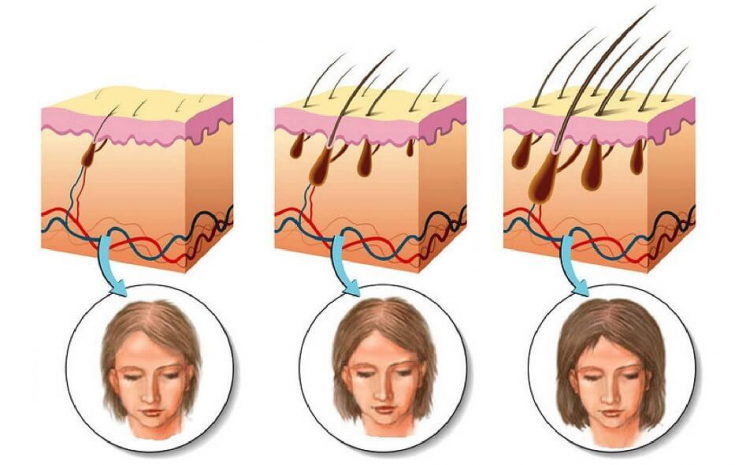Hair has always played an important role in human history. Egyptian hieroglyphs testify to the paramount importance of hair to this ancient civilization. For the ancient Romans, hair was not only a matter of fashion, but was also used as a symbol of beauty, courage, class and intelligence.
In today's Western culture, beautiful hair is often associated with desirable qualities, such as youth and vitality. However, hair, like skin, ages. Read on estet-portal.com how to stop alopecia areata.
- Age-related alopecia factors
- How a scalp condition can accelerate hair aging
- Age-related alopecia: how hormones can influence its occurrence
- Agesoneal alopecia treatment: no aging inlos
Factors that provoke age-related alopecia
Most people experience a change in the condition of their hair as they age. Genetic and hormonal changes are important factors in hair loss, but proper hair care habits also affect hair. Doctors agree that hair aging is an inevitable process that is determined by interaction of many factors including:
- hair care habits;
- UV exposure;
- hair color;
- androgenetic alopecia and other problems.
Most people don't know much about how to properly care for their hair and scalp.
Healthy hair and a healthy scalp usually complement each other, so a healthy scalp is essential for healthy hair and vice versa.
Genetic predisposition to alopecia found
Dermatology experts say that the characteristics of healthy hair include thickness, volume, luster and resilience of the fiber, as well as a healthy scalp – it is a scalp with normal density of follicless, without scaling, itching, burning or erythema.
How a scalp condition can accelerate hair aging
Chronic inflammation of the scalp likely impairs hair health through various mechanisms that are not well understood.
Read the most interesting articles in Telegram!
While research on the effects of chronic scalp inflammation on hair health is limited, plausible mechanisms include:
- cytokine reduction of hair lengthening in the anagen phase;
- miniaturization of the hair follicle.

The ideal environment required for healthy hair growth has yet to be determined, however changes in the external environment surrounding the follicle such as sebum, skin pollution, chronic inflammation, can significantly affect hair growth and health.
On the other hand, treatments aimed at reducing inflammatory conditions of the skin that are used to eliminate dandruff or to treat scalp infections are very traumatic to the hair shaftn and reduces the shine and health of the hair.
Age-related alopecia: how hormones can influence its occurrence
Age-related alopecia characteristics include:
- Reducing the amount of hair on the head;
- Occurs between the ages of 50 and 80;
- No previous history of thinning hair or underlying scalp disease;
- The presence of follicular miniaturization is controversial;
- Anagen shortening;
- Decreased anagen/telogen ratio.
The drop in estrogen levels that occurs during menopause can contribute to thinning hair, which is commonly seen in older women.
Certain areas of the scalp can androgen dependent as some women, like men, experience hair loss in specific areas.
Human stem cells for hair regeneration
The ideal androgen level for hair growth must be balanced against the negative effects of androgen administration, such as hirsutism, acne, and osteoporosis.
Age-related alopecia treatment: no hair aging
Many dermatologists recommend Minoxidil for age-related hair thinning, as this process is accompanied by a decrease in both hair density and hair follicle diameter.
Among hair loss medications , only a few have been proven effective in clinical trials:
- Minoxidil 5% solution (or Minoxidil 5% foam if allergic to the solution);
- Finasteride 1 mg 1 tablet once a day;
- Dutasteride 0.5 mg – 2.5 mg 1 tablet once a day.
Pure beauty: which hair shampoo to choose
Unapproved products with restricted clinical data:
- Ketoconazole hair products;
- copper peptide hair products;
- hair products with various vitamins, adenosine and herbal extracts.
Thus, it is possible to slow down hair aging and age-related alopecia. However, it is important to follow evidence-based medicine and use clinically proven medicines.
More useful and interesting information on our channel on YouTube:







Add a comment